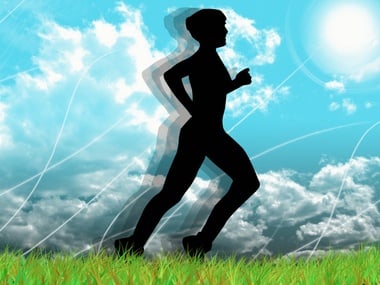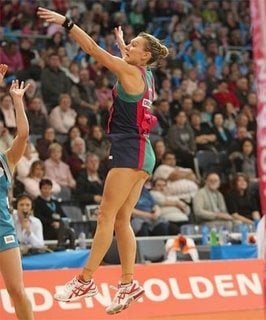Working With Athletes Over the last twenty five years I have (amongst other things) worked with many athletes at all levels of development and competition; boxers, aerial skiers, runners, throwers, swimmers, footballers (Australian Rules Football, Soccer and Gridiron), basketballers, netballers, bodybuilders, power-lifters, martial artists and lots more. From complete novices through to experienced Olympians, I have worked with them all. I have been employed by four professional sporting teams as a conditioning coach and this year I am working with the Melbourne Vixens; a professional netball team playing in the Trans-Tasman, Australia-New Zealand competition. I am involved in both the physical stuff (conditioning work) and also the head stuff (personal and professional development sessions). The girls are great to work with and I love that part of my professional life. Although looking up (literally) to twelve girls when you’re coaching them is somewhat strange when you’re a 5’10” bloke. Most of the girls are six foot plus but fortunately for insecure me, I have bigger guns. Just.
- You can see two of the girls in action: 1. Natasha Chokljat just below.
Years of working with elite athletes has taught me much about the mechanics, process and psychology of creating desirable outcomes (improvement, success, winning) and much of what we learn with athletes can be transferred to the ‘non-sporting’ world. Desirable outcomes for an athlete (depending on their sport) would be things like: improved skill, fitness, strength, speed, power, flexibility, muscular endurance, recovery time, reaction time, more game time, improved performance in their sport and of course, winning gold medals and finals. Having this background and experience has helped me enormously with the personal and professional development work I now do with individuals and organisations. We all want ‘better’, we just need to know what that means and how to create it. Training and Competition In sport we have two distinct components – training and competition – and naturally it makes sense to say that, as a rule, the better we train and prepare for our sport, the better we will perform on game day. We coaches find that athletes who train poorly, typically perform poorly (or not up to their potential) when it counts; in competition. Training Intensity. Being able to deal with physical, emotional and psychological pressure is a non-negotiable for the would-be champion. Some very talented people never succeed simply because they won’t do what needs to be done to maximise their potential. That is, get uncomfortable when they train and do it consistently. As a rule, competition is uncomfortable, even painful, but at the same time, it can be incredibly rewarding, exhilarating and enjoyable. We know that sport can be very demanding on not only the bodies, but also the minds of the athletes. We also know that athletes who spend the majority of their training time in their ‘comfort zone’ will invariably fail or under-perform at their chosen sport, because they are not prepared (physically or emotionally) for the reality and the demands of elite competition. Playing regular tennis with a ten year-old (even a lot of it) won’t prepare you for competitive tennis against highly-tuned adults of comparable ability to you. Comparable ability plus much better preparation equals much better performance. Train as You Intend to Play
“If you wanna play like a freak, train like a freak.” If athletes don’t hurt in training, they won’t develop the necessary skills, qualities and attributes to do what needs to be done when it matters; game time. As much as possible, coaches will simulate the type of intensity and pressure that game day brings because only that will truly condition an athlete for what he/she needs to do when it matters. I don’t care how well you can kick, throw, catch, pass, or side-step when you’re under no pressure and you’re physically fresh, I care how well you can perform those skills when it’s the last quarter, you’re down by two points, you’re physically exhausted, you’ve got people screaming at you, you’re stressed and you’ve got five opposition players doing their best to kill you. That’s when it matters. An Analogy Now, let’s take that thinking, understanding (it makes sense right?) and training approach, and apply it to the world of Personal Development; becoming a better version of us. Are we really developing (that is, changing in a real, practical and measurable way) or are we merely down-loading more and more self-help information that we don’t actually use? For this discussion, let’s say that coming here and reading articles such as this one is part (not the entirety) of your ‘training’ for your sport; your sport being… life. The Application Now, if we were going to take the above training approach and apply it to our personal growth journey, we would listen to the coach (in this instance, me), take the information and strategically, practically and consistently apply what we learn here over the course of our journey. That is, consciously put ourselves into situations where we are forced to step out of our predictable, safe, familiar, comfortable little box (oh yes, you know the one) and put ourselves into a simulated game situation; the place where we are forced to grow, learn, adapt and develop – like we say we want to. Let’s train like we wanna play. The truth is that when many ‘self-helpers’ are thrown into the game (that is, they are confronted with a real challenge in their world) they fall apart because they haven’t trained for it. Sure, they’ve read about it… if only reading was doing. Food For thought Q. How can the United States and Australia be two of the most educated countries in the world (in terms of health, diet, exercise, lifestyle etc.), while also being amongst the fattest (and still growing)? A. Because we know what to do, but we don’t do what we know. Too manyof us are great at the theoretical and complete crap at the practical. We continue to destroy ourselves despite our knowledge. We want the results without the work. We want the pill, the powder, the potion, the shortcut. When will we stop looking for answers in the wrong places? When will we be honest? When will we stop wasting our time and potential? Soon I hope. Not a Theory Personal growth and genuine transformation isn’t about the theoretical, it’s about the practical – and the practical is all about YOU. If you read, understand and remember every single word I ever write, but never apply any of it, you will see absolutely zero benefit or positive change in your world. So apply it. Do it. Consistently. And get uncomfortable. Consistently. There are far too many personal development junkies who are great at talking the talk – they even use all the self-help jargon (I know, I talk to them) – but in reality they are full of crap because they don’t actually live any of it. They tell others what to do, while not actually doing it themselves. The Pseudo Gurus, I call them. Reading does not equal transformation. Reading equals reading. Even knowing doesn’t equal transformation. There is an abundance of educated and knowledgable failures. A Little Tough Love I’m not trying to be offensive here, just honest. The time for being precious and politically correct is not now; now is the time to be realistic and practical about our behaviours, our habits, our mindset and the type of results we produce in our world. Sure I could dance around the real issues and do my best to protect some people’s fragile emotional states, but the truth is that we all need a big fat reality check from time to time and to be honest, I don’t care if I offend people when I’m speaking the truth. Some people will get offended no matter what I say or how I say it, because they are victims. While others choose to get real, they choose to get hurt. That’s their miserable prerogative. I won’t waste my time or energy on people who are not prepared to help themselves or be honest. When we take the emotion out of it and be completely practical and realistic (about creating better results), we discover that many (many, many) people – even the self-help types – have been going around in circles for years. Lots of hot air, talk and hype but no results. Harsh? Perhaps. Honest? Yep. When the St Hits the Fan When the st hits the fan – (this would be game time for an athlete) – and it always does, many people capitulate because they haven’t prepared for competition. They have the potential, the knowledge and the resources, but they didn’t have the courage, the focus or the work ethic to do what needed to be done; they didn’t ‘train’ the way they wanted to ‘play’. Some didn’t train at all. Decision Time? For some of you, it’s decision time. You know it and you’ve known for a long time. Of course you can find more reasons not to change and more ways to rationalise what you’re not doing, being and creating… or you can simply stop with the excuses and explanations… and change. Once and for all. You can train like you wanna play. You can be the change in your world. Today can be ‘just another day’ and this post can simply be ‘just another one of my articles’ that you don’t act on – or it can be the start of the most incredible journey you’ve ever had. I made my choice long ago.


